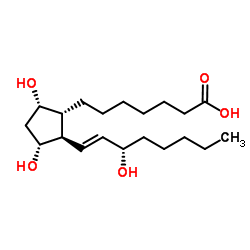Aspirin inhibits fractalkine expression in atherosclerotic plaques and reduces atherosclerosis in ApoE gene knockout mice.
Hong Liu, Deqian Jiang, Shebing Zhang, Baiqing Ou
Index: Cardiovasc. Drugs Ther. 24(1) , 17-24, (2010)
Full Text: HTML
Abstract
To determine the fractalkine expression in the aorta of ApoE (-/-) mice and the effect of high-dose aspirin intervention on fractalkine expression and atherosclerotic lesion formation.Twenty-one male ApoE gene knockout mice were randomized into three groups to receive either placebo in addition to normal mice chow (n = 7), placebo in addition to a high-fat diet (n = 7), or aspirin (58 mg/kg/d) in addition to a high-fat diet (n = 7). After 12 weeks of study, the mice were euthanized and serum cholesterol, thromboxane B(2), and 6-keto-PGF(1alpha) were examined. Fractalkine and cyclooxygenase expression in aorta were measured and the atherosclerotic lesion analyzed.Pathology image analysis showed that the atherosclerotic plaque was the most extensive in the high-fat diet group while the addition of aspirin greatly reduced the severity of the plaque. Both RT-PCR analysis and immunohistochemical analysis showed that fractalkine expression was the strongest in the high-fat diet group and was significantly decreased by aspirin treatment. Serum thromboxane B(2) was lowered by aspirin while 6-keto-PGF(1alpha) and cholesterol remained unchanged.The results of our study indicate that high dose aspirin can improve the atherosclerotic lesion and suppress the fractalkine expression in murine aorta.
Related Compounds
| Structure | Name/CAS No. | Molecular Formula | Articles |
|---|---|---|---|
 |
Prostaglandin F1α
CAS:745-62-0 |
C20H36O5 |
|
Influence of human low density and high density lipoprotein ...
1980-12-05 [Biochim. Biophys. Acta 620(3) , 352-5, (1980)] |
|
Native pentameric C-reactive protein displays more potent pr...
2006-01-01 [Atherosclerosis 184(1) , 48-52, (2006)] |
|
Long-term fenofibrate treatment impairs endothelium-dependen...
2007-07-15 [Cardiovasc. Res. 75(2) , 398-407, (2007)] |
|
The effect of the pro-inflammatory cytokine tumor necrosis f...
2010-01-01 [Arthritis. Res. Ther. 12(1) , R4, (2010)] |
|
Role of prostaglandins in delayed cerebral ischemia after su...
1992-01-01 [Neurosurgery 30(1) , 17-22, (1992)] |